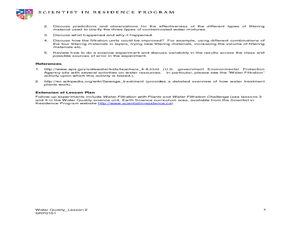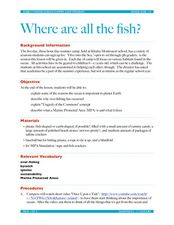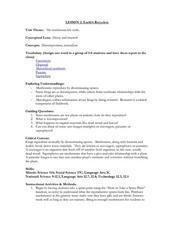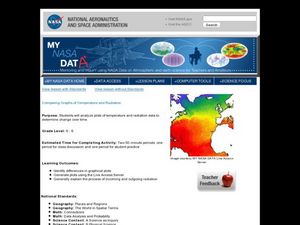Curated OER
Water Quality: Water Filtration
Learners build a water filtration system. In this water quality lesson, students work in groups to construct water filtration units that can purify contaminated water. This lesson is part of a larger unit on water quality.
Curated OER
Water filtration with Plants
Sixth graders explain how soil and plants effect contaminated water in nature. In this filtration lesson plan, 6th graders work in groups to test biofiltration units. Students determine which biofiltration units work best and how...
Curated OER
Oil Spill Cleanup
Learners participate in an oil spill simulation and how to clean it up. In this oil spill lesson plan, students also calculate the cost of the clean up of an oil spill.
Curated OER
Ecological Impact of River Dams
Students investigate their environment by completing an in-class experiment. In this ecological lesson, students define the roles of dams and how electricity is created by them. Students utilize plastic jugs, sand and tap...
Curated OER
Central Park Field Trip
Students visit the park to observe signs of spring in the forest and pond environments. In this field trip lesson, students explore the park for various items
Curated OER
Newton's Universal Law of Gravitation with Simple Machines
First graders engage in a lesson plan that is about Newton's Laws Of Gravitation while conducting research in order to perform an information search. They sing a song about the Law of Gravitation and play a game of Ring Around The Rosie....
Curated OER
Labeling Forces Correctly!
Define six common forces: propulsion, air resistance, water resistance, friction, gravity, and upthrust. A picture of a Smart Car is displayed with arrows showing all of the forces acting on it when it is motion. A picture of a rubber...
Curated OER
Matters of Milk and Marshmallows
Young scholars observe a teacher demonstration o classifying matter by its physical properties of shape and size. After discussing the definition of matter, students describe the state of matter. They sing a song to the tune of "Bingo."...
Curated OER
What are Rocks and Minerals? How can they help us?
Sixth graders investigate the difference between rocks and minerals. They name the three kinds of rocks (sedimentary, igneous, and metamorphic) and know the differences between them.
Curated OER
Where Are All the Fish?
Young scholars identify the problems that marine life is facing today. For this marine science lesson, students explain how Marine Protected Areas can help the ocean and the fish. They brainstorm ways to help in the conservation effort.
Curated OER
and and Ocean Views of Earth by Remote Sensing
Students explain how satellites help scientists to see more than with the unaided eye and how Landsat technology works. Students identify vegetation and fire sites in the rainforest and detect erosion along rivers. They are able to use...
Curated OER
Earth's Recyclers
Middle schoolers work together in groups to report on different topics related to decomposition. They answer questions and share their answers with the class. They discuss any topic that is unclear.
Curated OER
Environmental Science/Water Pollution
Students study natural habitats, aquatic life, renewable and non-renewable resources. They discuss conservation efforts for sea otters and desert toad in this units.
Curated OER
Earth & Space Science: Holding it Together
Students estimate how many drops of water can fit onto the surface of a penny and then test their hypothesis to find out. They also experiment with bubbles.
Curated OER
Will It Rain Today or Tomorrow?
Pupils examine how to forecast weather. They examine the different types of weather and learn the correct vocabulary.
Curated OER
Hydrology
In this science worksheet, learners find the vocabulary terms related to the subject of hydrology. The answers are found by clicking the button at the bottom of the page.
Curated OER
Weathering Rocks
Fourth graders investigate what natural events cause rocks to break apart and differentiate between erosion and weathering. They conduct an experiment with plaster of paris to observe why some rocks are hard and others break, and...
Curated OER
Air Engine - Air Races
Students conduct an experiment about air volume, density, and pressure. In this air lesson plan, students discuss air, and how it moves. They make predictions about what will happen during the balloon and string experiment. They document...
Curated OER
Volcanoes: Second Grade Lesson Plans and Activities
Young geologists explore volcanoes with a series of engaging geology activities. First, they learn the difference between magma and lava before coloring and labeling the parts of a volcano. During the lab, individuals watch a...
Cornell University
Constructing and Visualizing Topographic Profiles
Militaries throughout history have used topography information to plan strategies, yet many pupils today don't understand it. Scholars use Legos and a contour gauge to understand how to construct and visualize topographic profiles. This...
Science Friday
Capturing Carbon Dioxide
Why don't we just capture carbon dioxide in the air and store it somewhere else? A hands-on lesson allows scholars to explore a complex concept. First, they will create a carbonated beverage, and then they will determine...
Curated OER
Earthquakes: Third Grade Lesson Plans and Activities
Introduce third graders to energy waves with a hands-on geology activity, in which they answer questions and compare seismograms in the San Francisco Bay area. After a demonstration that shows how bigger waves indicate a...
Curated OER
Comparing Graphs of Temperature and Radiation
Students study plots and use a Live Access Server to generate plots. In this temperature lesson students examine the process of incoming and outgoing radiation.
Curated OER
Plate Tectonics: Second Grade Lesson Plans and Activities
Second graders explore convection currents and how they relate to the movement of tectonic plates. Then, young geologists reconstruct Pangaea with a worksheet and pinpoint plate boundaries on a map...

























